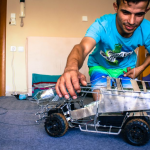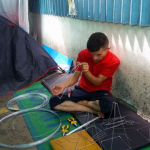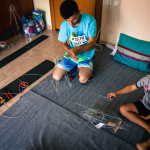Berlin, New York, Tokyo…
Marhan Jan’s wire sculptures are all over the world.
But Mahran can’t travel.
He cannot go back, Aleppo is destroyed. He cannot go forward, yet, because securing asylum takes a long time…
***
I first met Mahran and his wife in the Refugee Community centre in Sindos, Greece in early December 2016. A handsome, thirty-two-year old man of petite stature, he and his wife Mavret were there to celebrate the opening of the centre, a happy occasion in the sea of administrative appointments, medical check-ups or just plain boredom that life in the camps can bring.
Mahran is an artist, and Three Peas were interested to acquire some of his work to sell at auction. He invited us for a drink in his home at the shelter house in Sindos.
Mavret makes tea for everybody.
In a corner of this single room where the family of four eats, sleeps and lives, stands a little table: Mahran’s workstation. Pincers, wires, cutters… Later he will show us how, with an empty soft drink can, he builds wings for his planes, folding, then bending the little panes of aluminium around the wired armatures…
***
Originally from Afrin, near the Turkish border, Mahran’s family moved to Aleppo in the mid-nineties. Bored on a hot summer afternoon, the then twelve-year-old boy asked his mother if he could cut some of her spare laundry line… and started to twist and shape the metallic wire into a car. It soon turned into a competition with neighbouring friends. Who could build the best car?
It took patience and determination but Mahran won.
His vehicles were well known for being the strongest and the most beautiful . He was good at customer service and would mend the broken cars or bicycles when the play had been too rough. He was inventive and prolific. He was the best.
That summer, Mahran earned some pocket money selling his toy sculptures for one Syrian lira to the neighbouring boys.
***
Mahran grew up. He worked hard, and by his mid twenties he owned a little supermarket. He met Mavret and they married. Soon after followed the birth of their two boys.
Life kept him busy and Mahran forgot about wiring.
***
Then the war shook Syria,
By late 2012 Aleppo was destroyed. Hard times came to all. The price of food and daily essentials rocketed. The neighbourhood no longer had gas, electricity or running water. People started cooking by lighting a fire on their terrace, the typical flat roof of Aleppian houses.
While on their terrace one evening Mahran, Mavret and the children heard an explosion, quickly followed by a much louder one. The bombs were getting nearer. Mahran urged his family inside the house. He tried to reassure his children as well as he could. Then a third explosion, nearer still, followed by a rain of shrapnel. His eldest boy’s bicycle was cut in two.
It was time to go.
They left Aleppo for the family house in Afrin, where Mhran’s mother still lives, before seeking more permanent safety in Turkey, a first stop on the way to Europe, and most importantly, Mahran insists, a better future for his children. In Turkey he worked for three years, and saved enough money for their sea-crossing to Greece.
They reached Lesbos in the winter of 2015-2016. With many others in a similar situation, they made for the Macedonian (FYROM) border…but too late.
***
The border is now closed.
And the waiting game starts.
First in Idomeni camp. Mahran will not forget the duress of those four winter months, the cold and the damp, the entire family permanently ill.
***
In Idomeni, though, Mahran notices bits of wire from the border fences, left on the ground. He thinks of that summer long ago. He now has time on his hands. He is patient. He starts sculpting again with the metallic wires of this impossible border, his first piece a helicopter.
***
So here is Mahran, a modern Theseus in the Kafkaesque labyrinth of interviews, applications, registrations; caught up in the tangled web of queues for food, vouchers, healthcare, always with the goal of safety for his children, for his wife, for himself…
But now Mahran has a passion. He has his wire to unravel, his sculptures to shape. He is regaining control of his life…
His wife encourages him, and as do camp volunteers and journalists by acquiring pieces of his work. With the money he receives, he buys more material, better tools. He earns a living. By playing with the metallic thread, Mahran avoids the devastating Minotaur of inertia that eats at the pride and sense of self of so many men in the camps.
When Idomeni closes down, the family move to the Dervini camp. They meet big hearted volunteer Geo, who with Three Peas, will sponsor the family and find a flat for them, the flat where we are now drinking tea. It is small indeed for four people to share, but it gives the family privacy, warmth, and safety.
***
Sitting in a circle on a shaggy blue blanket we look at Mahran’s work. All available surfaces of furniture are covered with bicycles, helicopters, cars, planes, guitars, violins but also bracelets and earrings, animals and plants… all made of wire.
A tree with fruits of shiny beads and a butterfly of golden threads seem to come out of a fairy tale. The vehicles are exquisite: The bicycles’ kickstands lift, the wheels turn, the propellers spin. Mahran an has even made a remote-controlled truck for his sons.
Now a successful artist and craftsman, he has been invited to participate in many Greek fairs. He is touchingly proud of this. Mavret’s eyes are filled with love, recognition and admiration for the husband who has found his way.
Mahran’s vehicles are in Spain, Germany, China, Japan, Nederland, France, Denmark, United States, United Kingdom, Italy, Switzerland, Turkey, Australia and Greece. All around the world they fly, propelled by this man. And there he stands, at the epicentre of Europe’s, of the world’s shame, still somehow behind the wire.
Since writing the above, Mahran and his family’s four-year journey on the road might be touching its end -insha Allah- as they just have been granted asylum in Lithuania.
My thanks got to Mahran, for telling his story, to Mehdi, translator extrordinaire and to Celia for her English touch.
Clementine




